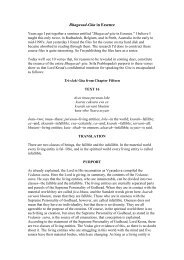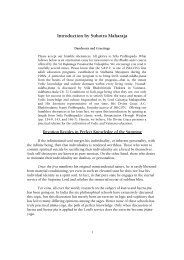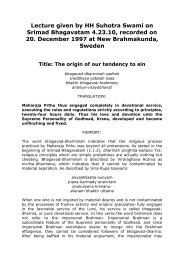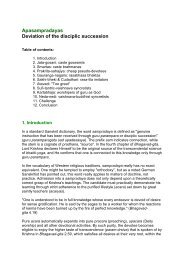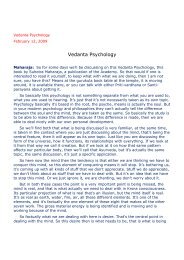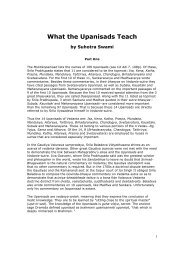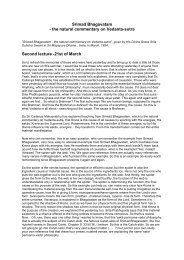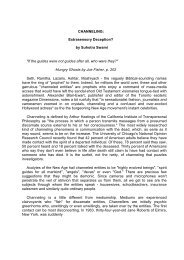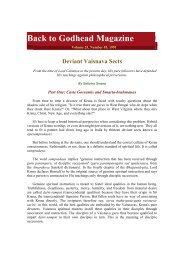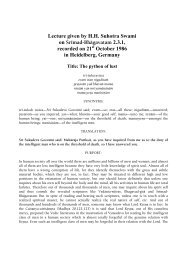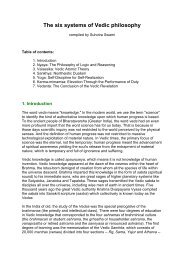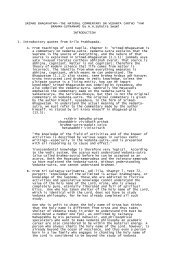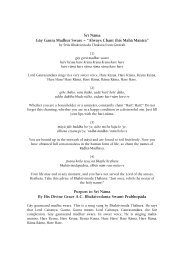The defects of "In Vaikuntha etc." have arisen because, of the two authors, onetakes lessons in Sanskrit and philosophy from a pandita who is not in the lineof Srila Bhaktisiddhanta Sarasvati Thakura, and the other is too fond ofargument.I am presently reading a translation by a disciple of Srila Prabhupada of JaivaDharma by Srila Bhaktivinoda Thakura. I've only forten through the first sevenchapters, but already I have found a number of explanations that corroboratewhat we know from Srila Prabhupada about the jiva's original status as aneternal servant of Krsna prior to his entering material existence. Bhaktivinodaconfirms that the jiva fell because of deliberately rejecting Krsna's service.He does not confirm that the jiva was for all eternity within the material worldand never had a relationship with Krsna at all. It is very clear to me fromthis that Srila Prabhupada exactly followed Srila Bhaktivinoda's footsteps inhis presentation of the jiva-tattva. Jiva-tattva is what Jaiva Dharma is allabout.Another point that should be mentioned is the duty a scholarly disciple has tothe founder-acarya. Srila Madhvacarya, who revived the Brahma Sampradaya in theKali Yuga, is still today considered in Indian philosophical circles as veryrevolutionary in his explanations of the Vedic knowledge. For instance, toconfound the Mayavadis, he refuted their favorite slogan, tattvamasi (I am thesame), by arguing that Sankaracarya quoted Chandogya 6.8.7 incorrectly. Thecorrect quote according to Madhva is atattvamasi (I am not the same). This andother explanations are so bold as to be unique in history. Therefore in booksabout Indian philosophy written by non-Vaisnavas one often finds Madhvacaryabeing accused of introducing non-traditional ideas into Vedic philosophicaldiscourse. Now, in the pre-Gaudiya history of the Brahma-Madhva Sampradaya,there are two great scholar-devotees after Madhva. These are Jayatirtha andVyasatirtha. Madhva is the 5th prominent acarya in our disciplic line, followedby Jayatirtha (the 10th) and Vyasatirtha (the 17th). They are referred to asthe muni-traya (three great sages) of the sampradaya efore Madhavendra Puri (the19th), who is the first Gaudiya acarya of the line. Jayatirtha and Vyasatirthaemployed their unlimited knowledge of the sastra and their Sanskrit expertise insoundly defeating all those who criticized the writings of Madhva, theirfounder-acarya. They did not try to deflect criticisms of Madhva's "radical"explanations by half-hearted appeals to some special preaching strategy of his.In this light, then, "In Vaikuntha etc." proves to be an annoying disservice tothe bold presentation of the Founder-acarya of ISKCON, Srila Prabhupada.I have a question for you. Does this name you use have anything to do with theAmerican slang expression I've sometimes heard, "happy camper"?Comment by (erased object 1833)March 25, <strong>1995</strong>, 13:50 SWTDear <strong>Maharaja</strong>,Please accept my most humble obeisances -- all glories to Srila Prabhupada andhis beloved representatives.Thank you for this explanation. I very much appreciate your analysis of theorigin of the falldown of "In Vaikuntha Not Even the Leaves Fall" --- that theSankritist learned his craft outside the sampradaya of Srila BhaktisiddhantaSarasvati, and that the English expert is just too argumentative. This is veryinteresting.Regarding my name, I know what you mean. Recently I came across 2 examples ofthe phrase "happy camper." In an esoteric magazine, a man who was interviewed
to tell how he was abducted to another planet by a UFO said about theexperience, "Believe me, I was not one happy camper!" In another magazine I sawan article about American prisoners of war that some people believe are stillbeing held in captivity by the Vietnamese. The magazine printed a questionablephotograph that these believers use as evidence. According to the USgovernment, the 3 white men in the photo are not Americans, but Russians. A USgovernment spokesman was quoted as saying, "All I see when I look at thispicture are 3 fat, happy campers."But actually in my case, Camper is an Anglicized version of Kaempfer. My fatherwas a Prussian of that name from Danzig (now called Gdansk) who moved to Canadaafter the Second World War, where he changed his name to Camper. He didn't likethe way people associated his name with "Mein Kampf". My first name is Hapgood,the name of a friend of my father in Halifax who helped him get established in"economic development" when he first arrived there. Shorten Hapgood to Hap, andyou have Hap Camper, my material upadhi.Your servant,Bhakta HapPS: Anything to say about Aum Shinrikyu, the poison gas sect in Japan?Comment by <strong>Suhotra</strong> SwamiMarch 25, <strong>1995</strong>, 13:53 SWTWho's heard of the Mad Gasser of Mattoon out there in <strong>Danda</strong>-land?Comment by (erased object 1833)March 25, <strong>1995</strong>, 13:56 SWTOh, yes, <strong>Maharaja</strong>! The Mad Gasser of Mattoon is a VERY esoteric reference! Iam impressed! He was something like a Midwestern USA Springheels Jack, onlywith poison gas that never left a trace.This Aum Shinrikyu group seems to be in touch with similar inauspicous entitiesas were behind old Springheels and The Mad Gasser.Comment by <strong>Suhotra</strong> SwamiMarch 25, <strong>1995</strong>, 13:58 SWTI think you are right about that. And of course there's Owl Man and The JerseyDevil ...Comment by (erased object 1833)March 25, <strong>1995</strong>, 14:01 SWT... what to speak of the Shaver Mystery.Comment by <strong>Suhotra</strong> SwamiMarch 25, <strong>1995</strong>, 14:04 SWTYes, the Shaver Mystery. What a study of borderline human psychosocial behaviorthat one is. One nut writes a strange letter to a science fiction magazine inthe late forties, and suddenly there's a whole movement of people gettingpsychic messages from Deros, Teros and whatnot.
- Page 1 and 2: DANDA1995Questions and AnswerswithH
- Page 3 and 4: I have already replied to the argum
- Page 5 and 6: Similarly, in an ISKCON temple, a d
- Page 7 and 8: even be well-intentioned (let the c
- Page 9 and 10: Answer by Suhotra SwamiJanuary 15,
- Page 11 and 12: Comment by Vipramukhya SwamiI've me
- Page 13 and 14: i.e. his visible form).to.In the pr
- Page 15 and 16: 1. The self-realization stage just
- Page 17 and 18: ksatriya families worshiped Radha-K
- Page 19 and 20: are banished from Kailasa by being
- Page 21 and 22: always in competition with each oth
- Page 23 and 24: Was that enough, Bhakta Jan? No? OK
- Page 25 and 26: prakampanaloka-gurusrastaparasmai t
- Page 27: That's they quoted from me.In the c
- Page 31 and 32: to come, and these ten avatars corr
- Page 33 and 34: emember and speak the best that has
- Page 35 and 36: devotees, but I gave them as exampl
- Page 37 and 38: CAITANYA UPANISADQuestion from Mukh
- Page 39 and 40: for that. So that... This is going
- Page 41 and 42: A footnote to the previous text:It
- Page 43 and 44: other planets encircle the polestar
- Page 45 and 46: TIME PERCEPTIONQuestions from Rohit
- Page 47 and 48: Answer by Suhotra SwamiJune 27, 199
- Page 49 and 50: connected to the Lord's body. And B
- Page 51 and 52: - How to understand there was no cr
- Page 53 and 54: SB 6.14.55 p., 1st par.: The subtle
- Page 55 and 56: could not even get that. And they l
- Page 57 and 58: "Krsna is the supreme living being.
- Page 59 and 60: Answer by Suhotra SwamiSeptember 26
- Page 61 and 62: Answer by Suhotra SwamiOctober 11,
- Page 63 and 64: Vidyabhusana that argued yet anothe
- Page 65 and 66: SELF-ENVYQuestions from Vrajendra K
- Page 67 and 68: I was studying the second canto cha
- Page 69 and 70: Answer by Suhotra SwamiNovember 11,
- Page 71 and 72: Answer by Suhotra SwamiNovember 11,
- Page 73 and 74: ATHEISMQuestion from Jahnu dasNovem
- Page 75 and 76: two years old and under, in accorda
- Page 77 and 78: that sense one would think the exte
- Page 79 and 80:
1) Yes, the message of Jesus is uni
- Page 81 and 82:
Paul rationalized that Jesus surviv
- Page 83 and 84:
The publication I am working on in
- Page 85 and 86:
- From the context of the second qu
- Page 87 and 88:
Dear Maharaja,I see that it is a qu
- Page 89:
associates, etc. Lord Vamana has Hi



